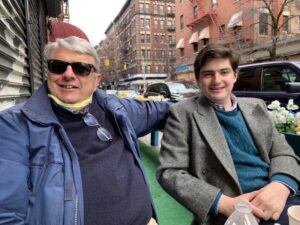
Timmy Facciola of Sleepy Hollow was part of a team of journalists with The New York Times that won a Pulitzer Prize on June 11, for Public Service journalism coverage of the Coronavirus. Facciola fact-checked and reported COVID-19 statistics from health departments, nursing homes and colleges from across the country.
Here he shares a Q&A with his father, Michael Facciola (MLF), a former journalist and teacher, about the award, the journey there, and the state of journalism today.
***

MLF: Do you remember where you were when you heard you had won?
TMF: I was on my way home after picking up lunch from Greene County Deli on Beekman Avenue in Sleepy Hollow. The streaming of the event had just started but I figured I had enough time to grab a sandwich beforehand. And then you called me.
MLF: I was with your mother coming home from a doctor’s appointment. We listened to it on YouTube. Your mother started crying, I started crying. We had to pull over on 287.
TMF: Yeah, and once you got home we danced in the driveway and cried some more. I think the neighbors were a bit confused.
MLF: Whom did you call first?
TMF: Well, first we fielded the phone calls that were incoming. I think the first person we reached out to was Rosemary Holodak, my teacher at Transfiguration School. You left her a message with the front office asking her to call back and that it was urgent, and when she called me back, it sounded like she thought someone had died.
MLF: What’d she say?
TMF: Well, she said she was surprised—relieved that everyone was still alive—though not too surprised. I also told her how formative learning to write a five-paragraph essay in her class was. I still draw on what she taught me to this day, and I’m certain I’m not the only former student of hers to do so. Then Mom, you, and I drank the champagne we had opened in the driveway but were too busy to drink.
MLF: What kind of champagne was it again?
TMF: Well, technically it was a Pet-Nat, from the boys over at Grape Expectations.
MLF: Where did you learn what you know about journalism?
TMF: Well, you always had a newspaper in hand when I was a kid, it definitely made journalism a “cool” thing in my mind. I had a great few years on The Heights at Boston College, but I don’t think it would have been so easy if I didn’t grow up with a resident editor in-house to call me out when my writing got lazy.
MLF: The defining new story of my generation was Watergate. I’m a Woodward-Bernstein-era ink-stained wretch. And you? What are you anyway?
TMF: A Covid-Zoomer data monkey.
MLF: Is that actually how you think of yourself?
TMF: Not all the time but working on spreadsheets for 40 hours a week takes a toll on your self-esteem. Though, I also use your generation’s Boomer reporting rules: assume nothing, consider the source, question authority.
MLF: I think your questioning authority predates COVID by at least 10 years.
TMF: Well, children learn by example.
MLF: Do you think there are any downsides to the sort of large-scale data journalism project you were a part of?
TMF: I don’t think it would have been possible to compile and publish the information we did if we weren’t operating at 30,000 feet in the air, which is always going to have its pros and cons. I mean we had a national map that had details by county, we had a college COVID tracker, a nursing home tracker. But I would have liked to talk to employees more when I would call to confirm COVID outbreaks in workplace settings.
MLF: What was the most shocking location you called to confirm an outbreak
TMF: I think the most interesting one was Cruisin’ Chubbys Gentlemen’s Club in Wisconsin. I called and left a message during the week but the owner didn’t get back to me until the middle of Father’s Day dinner. Only four cases, and thankfully everyone recovered.
MLF: Do you have any hesitation about joining a dying industry?
TMF: None whatsoever. Woe to the reporter who takes his cues from the earnings reports of legacy media outlets. The industry is about telling the truth, not making money
MLF: Actually?
TMF: I mean I would like to make a little money along the way, at least enough to pay rent, but I think it’s about comforting the afflicted and afflicting the comfortable.
MLF: Now that you have your name on a Pulitzer, when do you think you’ll move out of your childhood bedroom and into Manhattan?
TMF: I’m not sure—I’m pretty comfortable.
PHOTO: Michael and Timmy Facciola
CAPTION: Michael and Timmy Facciola







So awesome, now I can say I know a Pulitzer Prize winner – vicariously through your mom & dad!
Could not be more proud of you, Timmy.
Well deserved for hard work during a terrible, scary time.
And you have great mentors in your exceptional father and mother.